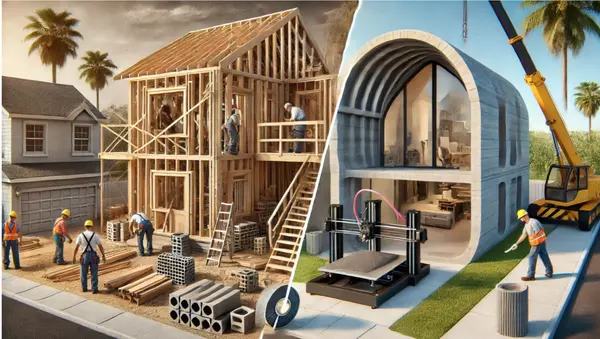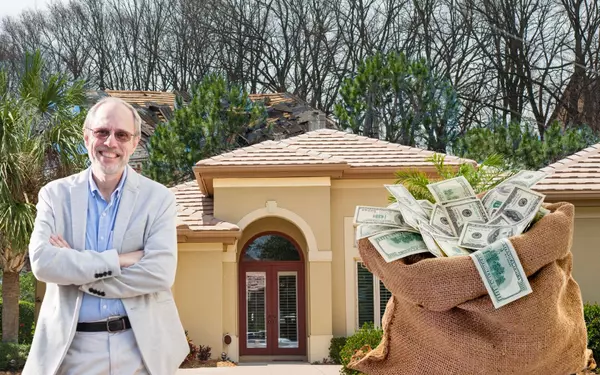10 Cost-Saving Strategies to Build a Home in Central Florida on a Budget
10 Cost-Saving Strategies to Build a Home in Central Florida Despite Rising Prices
Introduction
As a real estate expert in Central Florida, I’ve watched home construction costs climb steadily over the past five years. Higher labor prices, supply chain disruptions, material tariffs, and rising interest rates have made building more expensive than ever. However, with the right strategies, you can still build an affordable, high-quality home without compromising your vision.
Based on my experience, I’ve compiled the top cost-saving strategies for 2025 to help you navigate rising construction expenses. If you plan to build, here’s how to budget wisely and avoid hidden costs.
1. Smart Land Purchasing Tips in Central Florida
Finding Affordable Land in Desirable Areas
Choosing the right lot is one of the most critical financial decisions in homebuilding. Although land prices continue to rise in Central Florida, affordable options exist.
- Consider areas just outside major metro centers, such as Davenport, Haines City, and Deltona, where land is more affordable than in Orlando or Tampa.
- Prioritize lots with existing infrastructure—adding roads, utilities, and sewage later can drive up costs.
- Check land auctions, foreclosures, and government-owned properties for potential bargains.
Understanding Regional Zoning and Permitting Fees
Zoning laws and permitting fees vary across Florida. Many buyers don’t realize that fees can significantly impact the total cost of construction.
- In Orange County, permitting fees range from $2,000 to $5,000 per home.
- Impact fees, which help fund infrastructure, can exceed $10,000 in some areas.
Before committing to land, research permit and inspection fees to avoid unexpected expenses.
2. Cost-Effective Building Strategies to Lower Construction Costs
Downsizing for a Budget-Friendly Build
More square footage means higher costs. Instead of building a larger home, consider maximizing space efficiency.
- An optimized 1,800 sq. ft. home can feel as spacious as a 2,500 sq. ft. design when planned effectively.
- Tiny homes and accessory dwelling units (ADUs) offer affordable alternatives with investment potential.
Multi-Functional Spaces Reduce Square Footage
Designing flexible, open-concept spaces minimizes the need for extra rooms while maintaining functionality.
3. Choosing Affordable Home Construction Methods
Cost Comparison: Traditional vs. Alternative Construction
Traditional stick-built homes are expensive, but alternative methods can cut costs.
- Prefab and modular homes: Factory-built sections save 20–30% on labor.
- 3D-printed homes: Some projects cut construction expenses by up to 60% and speed up build times.
4. Ways to Save Money on Construction Materials
Bulk Purchasing for Discounts
Buying in bulk lowers material costs. Consider joining a builder’s co-op to access wholesale discounts.
Using Reclaimed Materials
Reclaimed wood, bricks, and fixtures from demolition sites or salvage yards save money while adding character.
Sustainable Alternatives to Traditional Lumber
Lumber prices fluctuate, but engineered wood and alternatives like hempcrete offer durable, cost-effective options.
5. Lowering Labor Costs in Home Construction
Smart Hiring Strategies for Subcontractors
Labor makes up 39–50% of total construction costs. Reduce expenses by:
- Receiving multiple bids for each task.
- Hiring subcontractors directly instead of paying a contractor’s markup.
Deciding Between DIY and Hiring Professionals
Some projects, like painting and flooring, can be DIY to save thousands. However, ensure local regulations allow homeowner-contracted work before taking on essential tasks.
6. Sustainable Materials for Long-Term Savings
Durable Roofing Options
- Metal roofing lasts 2–3 times longer than asphalt and reduces cooling costs by 25%.
Energy-Efficient Insulation
- Spray foam insulation is 10–20% more energy-efficient than fiberglass, lowering long-term expenses.
Reducing Construction Waste
- Ordering pre-cut materials minimizes waste and prevents unnecessary costs.
7. Energy Efficiency Strategies to Cut Utility Costs
Efficient HVAC Systems
Installing an ENERGY STAR-rated HVAC system can cut heating and cooling costs by 10–30% annually.
Renewable Energy Savings
- Florida tax credits can reduce solar panel installation costs by 30%.
- Over time, solar systems can eliminate electricity bills.
Energy Rebates for New Builds
Programs like Florida PACE financing offer zero-upfront-cost upgrades for renewable energy improvements.
8. Maximizing Financing and Builder Incentives
Best Loan Options
- USDA Construction Loans offer low rates for rural homebuyers.
- FHA One-Time Close Loans require as little as 3.5% down.
Government Incentives for Builders
State and federal programs provide rebates for green housing, solar, and hurricane-resistant builds.
Builder Incentives
- Many Florida builders cover closing costs or offer free appliance upgrades.
9. Best Time to Build for Maximum Savings
How Timing Affects Costs
Seasonality impacts construction pricing and availability.
- Labor shortages and material delays peak in summer.
- Winter (January–March) often means lower costs due to reduced demand.
Interest Rate Considerations
Starting before further interest rate hikes helps control financing expenses.
10. Avoiding Hidden Costs and Unexpected Expenses
Common Costly Mistakes
- Underestimating foundation and engineering costs.
- Overlooking necessary permit and inspection fees.
Planning for Unexpected Expenses
- Setting aside 10–15% of your budget as a contingency prevents financial strain.
Prioritizing Essential vs. Optional Features
- Focus on structural integrity and energy efficiency first.
- Upgrade finishes later to reduce immediate costs.
Conclusion
Building a home in Central Florida on a budget is possible with the right approach. By making smart decisions on land, materials, and construction methods, you can keep costs low while creating a high-quality home.
If you’re ready to start planning, let’s talk! Contact me today for a free, no-obligation consultation to explore your best options for affordable, energy-efficient home construction in Central Florida.
Legal Disclaimer Last Updated: March 9, 2025 1. No Professional Advice The content on this blog is for informational purposes only and does not constitute legal, financial, tax, or professional real estate advice. Consult a licensed attorney, accountant, or real estate professional for guidance specific to your situation. 2. Accuracy & Timeliness Real estate markets, laws, and regulations change frequently. While I strive to provide accurate information, I make no guarantees about the completeness, reliability, or currentness of the content. Verify critical details independently. 3. No Broker-Client Relationship Reading this blog or contacting me through it does not establish a broker-client or agency relationship. Such relationships require a formal written agreement. 4. Third-Party Links This blog may include links to third-party websites or services. I do not endorse or assume responsibility for their content, privacy practices, or accuracy. 5. Affiliate/Partnership Disclosures I may receive compensation for partnerships, affiliate links, or promoted products/services mentioned here. However, I only share tools or resources I genuinely recommend. 6. Fair Housing & Compliance [Your Business Name] adheres to all applicable federal, state, and local laws, including the Fair Housing Act, RESPA, and anti-discrimination regulations. 7. Market Risks Real estate investments carry risks, including market fluctuations and regulatory changes. Past performance does not guarantee future results. 8. No Liability Under no circumstances will Bent Danholm, MAXIM Realty Orlando, or MAXIM LLC be liable for any direct, indirect, or consequential damages arising from your use of this blog’s content. 9. Copyright Notice All content is owned by Bent Danholm and/or MAXIM Realty Orlando, or MAXIM LLC unless stated otherwise. Unauthorized reproduction is prohibited. This disclaimer may be updated at any time without notice.
Categories
- All Blogs (23)
- Affordable Housing Solutions (1)
- Business and Lifestyle in Central Florida (1)
- Buying a Luxury Home (5)
- Celebration, FL (2)
- Central Florida Housing Market (4)
- Central Florida Real Estate (15)
- Community Spotlight (4)
- Custom Home Building (1)
- Eco-Friendly Luxury Homes (2)
- Energy-Efficient Homes (1)
- Exclusive Neighborhoods (7)
- First-Time Homebuyers (1)
- Florida Lifestyle (3)
- Gated Communities (2)
- Golf Communities (1)
- Gotha, FL Communities (1)
- High-End Property Sales Strategies (2)
- Historic Properties (1)
- Home Builders in Central Florida (1)
- Home Buying Guide (1)
- Home Buying Tips (10)
- Home Design and Architecture (3)
- Home Financing (1)
- Home Pricing Strategies (1)
- Home Restoration (1)
- Home Search Strategies (1)
- Home Selling Options (2)
- Home Selling Tips (4)
- Home Staging (1)
- Homebuyer Tips (7)
- Homeownership (7)
- Homes for sale (1)
- Investment Properties (2)
- Lake Nona, FL (2)
- Lakefront Properties (3)
- Luxury Homes (9)
- Luxury Homes in Central Florida (6)
- Luxury Living (4)
- Luxury Market Insights (1)
- Luxury Property Listings (2)
- Luxury Real Estate (10)
- Luxury Real Estate Marketing (3)
- Mortgage and Financing (3)
- Moving to Florida (2)
- Negotiation Strategies (1)
- Neighborhood Guides (9)
- New Construction Homes (3)
- Off-Market Properties (1)
- Orlando Luxury Homes (3)
- Personal Finance (1)
- Property Investment (3)
- Real Estate Investment (3)
- Real Estate Market Trends (8)
- Real Estate Risks (1)
- Real Estate Selling Tips (2)
- Relocation Guide (6)
- Renting vs Buying (1)
- Selling Luxury Homes (2)
- Subject-To Sales (1)
- Suburban Living (1)
- Sustainable Housing (1)
- Technology in Real Estate (1)
- Waterfront Properties (2)
- Windermere Real Estate (2)
- Winter Park Real Estate (2)
Recent Posts












